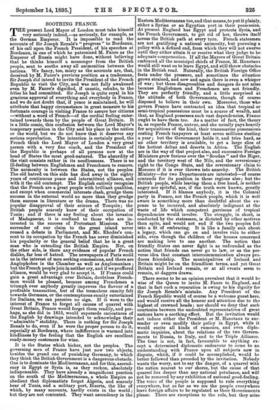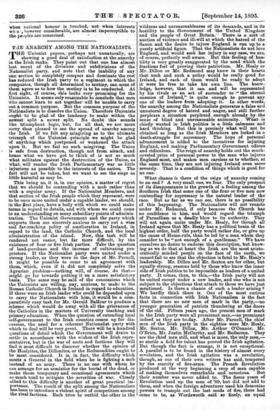SOOTHING FRANCE.
T"present Lord Mayor of London must take himself very seriously indeed,—as seriously, for example, as the German Emperor. It is impossible to read the accounts of Sir Joseph Renala's " progress " to Bordeaux, of his call upon the French President, of his speeches at Bordeaux, in one of which he patronised M. Faure as the Emperor of Russia might have done, without believing that he thinks himself a messenger from the British people, sent to soothe away all animosities between the nations. We fancy, too, misty as the accounts are, that, deceived by M. Faure's previous position as a tradesman, Sir Joseph did intend to invite the President of the French Republic to visit the City, and was not fully awakened even by M. Faure's dignified, if caustic, rebuke, to the baize he had committed. Sir Joseph is quite royal in his gracious approval of everything and everybody in France, and we do not doubt that, if peace is maintained, he will attribute that happy circumstance in great measure to his fortunate courage in visiting France to assure her citizens —.without a word of French—of the cordial feeling enter- tained towards them by the people of Great Britain. It is a little comic, this confusion between the Lord Mayor's temporary position in the City and his place in the nation or the world, but we do not know that it deserves any serious reprobation. The intention is certainly good, the French think the Lord Mayor of London a very great person with a very fine coach, and the President of the Republic is perhaps of all persons now at the head of States the most good-natured. The absurdity of the visit consists rather in its needlessness. There is no ill-feeling between Englishmen and Frenchmen to remove. The animosity is between the States, not the peoples. The old hatred on this side has died away in the eighty years of continuous peace and intermittent alliance, and with it the old contempt. The English entirely recognise that the French are a great people with brilliant qualities, and except when commercial interests clash, grudge them success in the external world no more than they grudge them success in literature or the drama. There was no popular disapproval of their seizure of Tonquin ; the British people scarcely knew of their occupation of Tunis; and if there is any feeling about the invasion of Madagascar, it is confined to those who are in- terested in the success of Protestant Missions. The surrender of our claim to the great island never roused a debate in Parliament, and Mr. Rhodes's con- sent to its occupation by the French has never diminished his popularity or the general belief that he is a great man who is extending the British Empire. Nor, on the other side, is there any evidence of popular French dislike, far less of hatred. The newspapers of Paris scold us in the interest of men seeking concessions, and there are Anglophobes in the Chamber as well as Anglomaniacs ; but the French people join in neither cry, and if we proffered alliance, would be very glad to accept it. If France could gain a great advantage over Britain, doubtless French- men would be pleased, because among Frenchmen a triumph over anybody greatly improves the flavour of a profitable transaction, but of the tremulous enmity felt towards Germans, or the contemptuous enmity entertained for Italians, we can perceive no sign. If it were to the interest of France to forget all causes of quarrel with Great Britain, France would forget them readily, and per- haps, as she did in 1855, would supersede caricatures of the English by drawings intended to acknowledge their " admirable " stolidity. There is nothing for Sir Joseph Renals to do, even if he were the proper person to do it, especially at Bordeaux, where indifference is warmed into kindliness by the feeling that the English are excellent ready-money customers for wine.
It is the States which bicker, not the peoples. The governing men of France have just now two objects, besides the grand one of punishing Germany, to which they think the British Government is a dangerous obstacle. One is to dominate the Mediterranean, and for this, ascend- ency in Egypt or Syria is, as they reckon, absolutely indispensable. They have already a magnificent position on the south of the Mediterranean, a whole Empire so obedient that diplomatists forget Algeria, and scarcely hear of Tunis, and a military port, Bizerta, the like of which, by many accounts, hardly exists in the world ; but they are not contented. They want ascendency in the Eastern Mediterranean too, and that means, to put it plainly, either a Syrian or an Egyptian port in their possession. At present England has Egypt and protects Syria, and the French Government, to get rid of her, throws itself across the British path at every turn. French statesmen are not gratifying a national animosity, but pursuing a policy with a defined end, from which they will not swerve until they either attain it or receive what they judge to be adequate compensation. If all the Mayors of Great Britain embraced all the municipal chiefs of France, M. Hanotaux would still want us to leave Egypt, and still throw obstacles in the British road. Naturally, the British Foreign Office frets under the pressure, and sometimes the situation grows strained, and now and again there is even a whisper of war; but these disagreeables and dangers do not arise because Englishmen and Frenchmen are not friendly. They are perfectly friendly, and a little surprised at the attitude of both Governments, though of course disposed to believe in their own. Moreover, those who govern France have contracted an idea that tropical or semi-tropical possessions must be a source of wealth, and that, as England possesses such vast dependencies, France ought to have them too. As a matter of fact, the theory is, as regards France, untrue, and she usually pays heavily for acquisitions of the kind, their transmarine possessions costing French taxpayers at least seven millions sterling a year ; but the Government holds it, and tries hard, as no other territory is available, to get a large slice of the hottest deltas and deserts in Africa. The English are in the way of that project also, and successive Foreign Ministers grow furious over the " Soudan " and the Niger, and the territory west of the Nile, and the reversionary right to the Congo State, and the reversionary claim to Morocco if it is ever thrown into anarchy. The British Ministry—for two Departments are interested—of course contends for its position in these regions also ; but the British people, while leaving them a free hand, is neither angry nor spiteful, nor, if the truth were known, greatly interested. If it blames anybody, it is the Colonial party in France, not the French people, which it is well aware is something more than doubtful about the ex- pense to be incurred, and absolutely indignant at the waste of life which competent garrisons of tropical dependencies would involve. The struggle, in short, is conducted by the statesmen, is dictated by other motives than spite, and would not end if the two peoples fell into a fit of embracing. It is like a family suit about a legacy, which can go on and involve ruin to either side, even though the children of the houses concerned are making love to one another. The notion that friendly States can never fight is as unfounded as the notion that friends can never go to law, or as the per- verse idea that constant intercommunication always pro- duces friendship. The municipalities of Ireland and Britain might be on the friendliest terms, and yet Great Britain and Ireland remain, or at all events seem to remain, at daggers drawn.
There seems to be an opinion prevalent that it would be wise of the Queen to invite M. Faure to England, and that in fact such a reparation is owing to his dignity for Sir Joseph Renals's mistake. Any President of the French Republic would of course be a welcome guest here, and would receive all the honour and attention due to the highest of crowned heads ; nor should we deny that such courtesies between the undoubted representatives of great nations have a soothing effect. But the invitation would not induce either the President or M. Hanotaux to sur- render or even modify their policy in Egypt, while it would excite all kinds of rumours, and even diplo- matic inquiries, about the relations of the two Govern- ments to Russia, to Italy, and to the Triple Alliance. The time is not, in fact, favourable to anything ex- cept a determined diplomatic endeavour to come to an understanding with France upon all subjects now in dispute, which, if it could be accomplished, would be better followed than preceded by the invitation. Nobody wants the worry, not to say the danger, of a quarrel with the nation nearest to our shores, but the cause of that quarrel lies deeper than any national petulance, and will not be removed by any exhibition of national good-feeling. The voice of the people is supposed to rule everything everywhere, but as far as we see the people everywhere leave foreign affairs to be regulated as their Governments please. There are exceptions to the rule, but they arise when national honour is touched, not when interests wh however considerable, are almost imperceptible to the peiples are concerned.



































 Previous page
Previous page